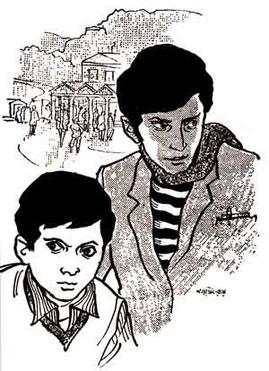
Feluda is a fictional detective, private investigator created by Indian director and writer Satyajit Ray. Feluda resides at 21 Rajani Sen Road, Ballygunge, Calcutta, West Bengal, India. Feluda first made his appearance in a Bengali children's magazine called Sandesh in 1965, under the editorialship of Ray and Subhas Mukhopadhyay. His first adventure was Feludar Goendagiri. Feluda is one of the most impactful Bengali characters of all time.

Victor Banerjee is an Indian actor who appears in English, Hindi, Bengali and Assamese language films. He has worked with directors such as Roman Polanski, James Ivory, Sir David Lean, Jerry London, Ronald Neame, Satyajit Ray, Mrinal Sen, Shyam Benegal, and Montazur Rahman Akbar. He won the National Film Award for Best Supporting Actor for the film Ghare Baire. He was awarded the Padma Bhushan, India's third highest civilian award, in 2022 for his huge contribution to cinema by the Indian Government in the field of art.
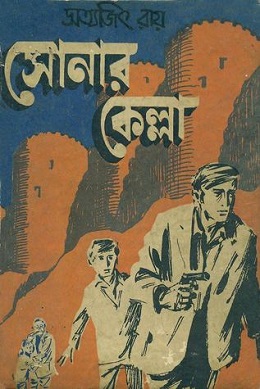
Sonar Kella, also Shonar Kella, is a 1971 mystery novel written by Bengali writer and filmmaker Satyajit Ray. In 1974, Ray directed a film adaption of the book, also named Sonar Kella, starring Soumitra Chatterjee, Santosh Dutta, Siddartha Chatterjee and Kushal Chakraborty. The movie was released in the United States as The Golden Fortress. It is the first film adaptation of Ray's famous sleuth Feluda and was followed by Joi Baba Felunath, in English The Elephant God.

Jalsaghar is a 1958 Indian Bengali drama film written and directed by Satyajit Ray, based on a popular short story by Bengali writer Tarasankar Bandyopadhyay, and starring Chhabi Biswas. The fourth of Ray's feature films, it was filmed at Nimtita Raajbari at Nimtita, in Murshidabad district. Despite initial poor critical reception in India, Jalsaghar went on to win the Presidential Award for best film in New Delhi, and played a significant role in establishing Ray's international reputation as a director. It has since gained near-universal critical acclaim, and has come to be regarded by the cinema community as one of the greatest films of all time.
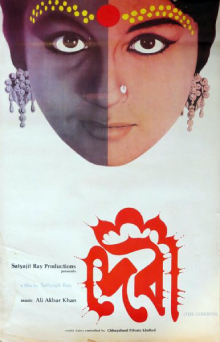
Devi (transl. Goddess) is a 1960 Bengali-language drama by director Satyajit Ray, starring Sharmila Tagore and Soumitra Chatterjee. It is based on a short story by Prabhat Kumar Mukhopadhyay. The film is based on believing in a dream, that a Zamindar has witnessed, where he is delusional about his daughter-in-law revealing herself into a Goddess incarnate, worthy of being idolized and worshiped.

Aranyer Din Ratri is an Indian Bengali adventure drama film released in 1970, written and directed by Satyajit Ray. It is based upon the Bengali novel of the same name by Sunil Gangopadhyay. It employs the literary technique of the carnivalesque. The film was nominated for the Golden Bear for Best Film at the 20th Berlin International Film Festival. A sequel Abar Aranye directed by Goutam Ghose was released in 2003.
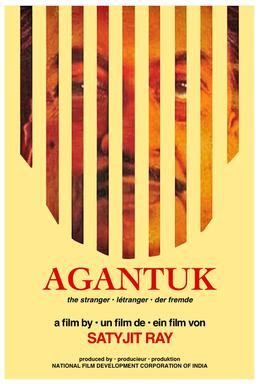
Agantuk is a 1991 Bengali-language drama film written and directed by Satyajit Ray. Notable for being Ray's last film, it was based on one of his own short stories, Atithi. A joint Indo-French production, it received financial backing from companies such as Gérard Depardieu's DD Productions and Canal+.

Hirak Rajar Deshe is an Indian Bengali dystopian fantasy musical film and a sequel to the 1969 anti-war fantasy musical Goopy Gyne Bagha Byne directed by Satyajit Ray. In the film, the musicians Goopy and Bagha travel to the kingdom of the Diamond King, to find a sinister plot at work – subjects are being brainwashed by rewriting their thoughts with rhyming slogans.

Abhijan is a 1962 Indian Bengali-language film directed by Satyajit Ray.
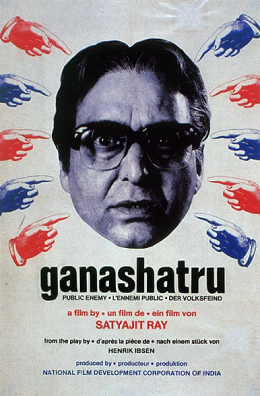
Ganashatru is a 1990 Indian film directed by Satyajit Ray. It is an adaptation of Henrik Ibsen's 1882 play An Enemy of the People, and was released under that title in the UK. The cast includes Ray's favourite actor Soumitra Chatterjee, and veteran actors such as Dhritiman Chatterjee, Shubhendu Chatterjee, Manoj Mitra and Ruma Guhathakurta. Ray adapts the play to an Indian setting: a flourishing township in which a temple attracts devotees as well as tourists. When a health problem is discovered, Dr Ashok Gupta, played by Soumitra Chatterjee, finds his popularity flagging. The film was screened out of competition at the 1989 Cannes Film Festival.

Jana Aranya is a 1976 Bengali film directed by Satyajit Ray, based on the novel of the same name by Mani Shankar Mukherjee. It is the last among Ray's Calcutta trilogy series, the previous two being, Pratidwandi and Seemabaddha.
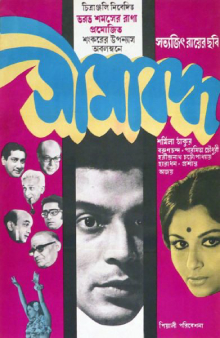
Seemabaddha is a 1971 social drama Bengali film directed by Satyajit Ray. It is based on the novel Seemabaddha by Mani Shankar Mukherjee. It stars Barun Chanda, Harindranath Chattopadhyay, and Sharmila Tagore in lead roles. The film was the second entry in Ray's Calcutta trilogy, which included Pratidwandi (1970) and Jana Aranya (1976). The films deal with the rapid modernization of Calcutta, rising corporate culture and greed, and the futility of the rat race. The film won the FIPRESCI Award at the 33rd Venice International Film Festival, and the National Film Award for Best Feature Film in 1971.

Sukumar Ray is a 1987 Bengali short documentary film made by Satyajit Ray on his father, Sukumar Ray. It was released during the birth centenary year of Sukumar Ray, who was born on 30 October 1887. The thirty minutes documentary features the life and some of the works by Sukumar Ray in the form of paintings, photographs and readings.
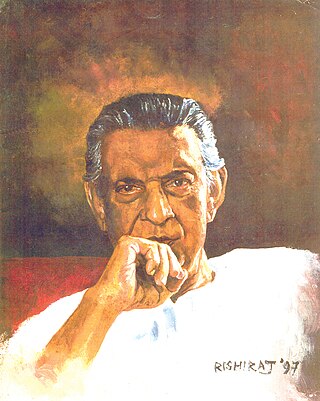
Satyajit Ray was an Indian filmmaker who worked prominently in Bengali cinema and who has often been regarded as one of the greatest and most influential directors in the History of cinema. Ray was born in Calcutta to a Bengali family and started his career as a junior visualiser. His meeting with French film director Jean Renoir, who had come to Calcutta in 1949 to shoot his film The River (1951), and his 1950 visit to London, where he saw Vittorio De Sica's Ladri di biciclette (1948), inspired Ray to become a film-maker. Ray made his directorial debut in 1955 with Pather Panchali and directed 36 films, comprising 29 feature films, five documentaries, and two short films.

Satyajit Ray (1921–1992), a Bengali film director from India, is well known for his contributions to Bengali literature. He created two of the most famous characters in Feluda the sleuth and Professor Shanku the scientist. He wrote several short novels and stories in addition to those based on these two characters. His fiction was targeted mainly at younger readers, though it became popular among children and adults alike.

Rabindranath Tagore is a 1961 Indian documentary film written and directed by Satyajit Ray about the life and works of noted Bengali author Rabindranath Tagore. Ray started working on the documentary in early 1958. Shot in black-and-white, the finished film was released during the birth centenary year of Rabindranath Tagore, who was born on 7 May 1861. Ray avoided the controversial aspects of Tagore's life in order to make it as an official portrait of the poet. Though Tagore was known as a poet, Ray did not use any of Tagore's poetry as he was not happy with the English translation and believed that "it would not make the right impression if recited" and people would not consider Tagore "a very great poet," based on those translations. Satyajit Ray has been reported to have said about the documentary Rabindranath Tagore in his biography Satyajit Ray: The Inner Eye by W. Andrew Robinson that, "Ten or twelve minutes of it are among the most moving and powerful things that I have produced."

The Inner Eye is a 1972 short documentary film made by Satyajit Ray on Benode Behari Mukherjee, a blind artist and a teacher from Visva-Bharati University, a university founded by Rabindranath Tagore at Santiniketan. The twenty minutes documentary features the life and works of Mukherjee in the form of paintings and photographs, starring himself. The documentary covers his journey from childhood till his blindness along with much of his works and features his words, "Blindness is a new feeling, a new experience, a new state of being". The documentary was awarded as Best Information Film (Documentary) at 20th National Film Awards in 1972.

Bala is a 1976 documentary film made by Satyajit Ray, about a Bharatanatyam dancer, Balasaraswati, fondly known as "Bala". The film was jointly produced by National Centre for the Performing Arts and Government of Tamil Nadu. The thirty-three-minute documentary features the life and some of the works by Balasaraswati in the form of narration and dance, starring herself. At the age of fourteen, Ray had seen a performance of Balasaraswati in Kolkata, then known as "Calcutta", in 1935, when she was seventeen years old.
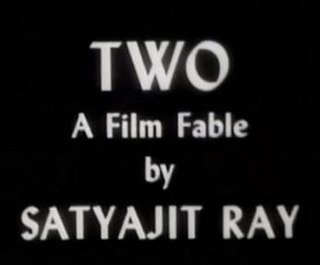
Two: A Film Fable is a 1964 Indian black-and-white short film directed by Satyajit Ray. The film was made under the banner of Esso World Theater at the request of a non-profit American public broadcasting television, PBS. It was made as part of a trilogy of short films from India. The other two films in the trilogy featured Indian Sitar player, Pandit Ravi Shankar and a Ballet troupe from Mumbai, then known as "Bombay". Ray, who worked prominently for Bengali cinema, was requested to make a film in English language with a Bengali setting, however Ray being an admirer of silent film decided to make a film without any dialogue as a tribute to the genre.

Satyajit Ray was an Indian film director, screenwriter, author, lyricist, magazine editor, illustrator, calligrapher, and composer. Ray is widely considered one of the greatest and most influential film directors in the history of cinema. He is celebrated for works including The Apu Trilogy (1955–1959), The Music Room (1958), The Big City (1963), Charulata (1964), and the Goopy–Bagha trilogy (1969–1992).[a]




















